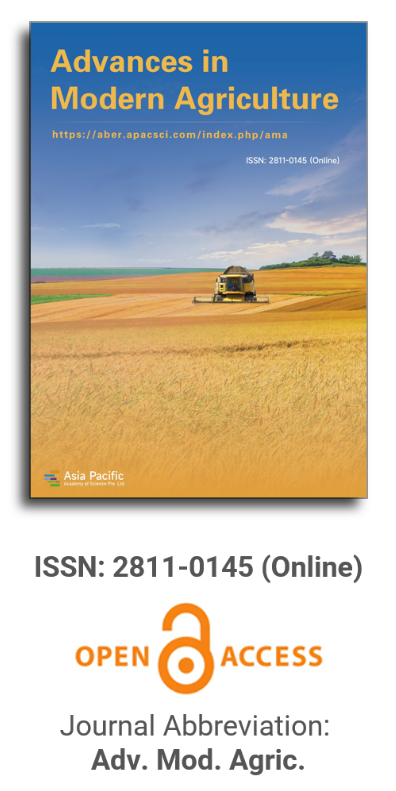


Effects of irrigation methods on transpiration and water use efficiency of tomato
Vol 3, Issue 1, 2022
VIEWS - 4406 (Abstract)
Download PDF
Abstract
Keywords
References
- National Bureau of Statistics of China. 2020 China Statistical Yearbook (Chinese). China Statistics Press; 2020.
- Yu J, Zhou J. Progress and prospects of vegetable production and technology in China during the 12th Five-Year Plan Period (Chinese). China Vegetables 2016; 9: 18–30.
- Sun Y, Hu K, Fan Z, et al. Simulating the fate of nitrogen and optimizing water and nitrogen management of greenhouse tomato in North China using the EU-Rotate_N model. Agricultural Water Management 2013; 128: 72–84. doi: 10.1016/j.agwat.2013.06.016
- Liang B, Kang L, Ren T, et al. The impact of exogenous N supply on soluble organic nitrogen dynamics and nitrogen balance in a greenhouse vegetable system. Journal of Environmental Management 2015; 154: 351–357. doi: 10.1016/j.jenvman.2015.02.045
- Liang H, Lv H, Batchelor WD, et al. Simulating nitrate and DON leaching to optimize water and N management practices for greenhouse vegetable production systems. Agricultural Water Management 2020; 241: 106377. doi: 10.1016/j.agwat.2020.106377
- Zhao Y, Lv H, Qasim W, et al. Drip fertigation with straw incorporation significantly reduces N2O emission and N leaching while maintaining high vegetable yields in solar greenhouse production. Environmental Pollution 2021; 273: 116521. doi: 10.1016/j.envpol.2021.116521
- Zhou J, Ma Y, Wu M, et al. Study on water and nitrogen utilization and biological effects of winter wheat under different water and fertilizer measures (Chinese). Journal of Irrigation and Drainage 2019, 38(9): 36–41.
- Liu J, Qiu H, Zhang W, et al. Effects of irrigation methods and biomass charcoal on winter wheat yield and water and fertilizer utilization efficiency (Chinese). Journal of Irrigation and Drainage 2021; 40(6): 59–65.
- Yang H, Du T, Qiu R, et al. Improved water use efficiency and fruit quality of greenhouse crops under regulated deficit irrigation in northwest China. Agricultural Water Management 2017; 179: 193–204. doi: 10.1016/j.agwat.2016.05.029
- Nie B, Li W, Jiang L, et al. Effects of different irrigation methods on nitrate nitrogen distribution in soil profile and irrigation water efficiency of protected tomato (Chinese). Research of Soil and Water Conservation 2012; 19(3): 102–107.
- Lv H, Lin S, Wang Y, et al. Drip fertigation significantly reduces nitrogen leaching in solar greenhouse vegetable production system. Environmental Pollution 2019; 245: 694–701. doi: 10.1016/j.envpol.2018.11.042
- Liang Y, Gao Y, Wang G, et al. Luxury transpiration of winter wheat and its responses to deficit irrigation in North China Plain. Plant, Soil and Environment 2018; 64(8): 361–366. doi: 10.17221/331/2018-pse
- Zhang P, Liu L, Bai X, Zhu J. The relationship between photosynthetic transpiration and ion accumulation of Vitex unifolia under different light intensities (Chinese). Acta Ecologica Sinica 2012; 32(11): 3432–3439. doi: 10.5846/stxb201105050588
- Collins AR, Burton AJ, Cavaleri MA. Effects of experimental soil warming and water addition on the transpiration of mature sugar maple. Ecosystems 2017; 21(1): 98–111. doi: 10.1007/s10021-017-0137-9
- Ayeneh A, Van Ginkel M, Reynolds MP, Ammar K. Comparison of leaf, spike, peduncle and canopy temperature depression in wheat under heat stress. Field Crops Research 2002; 79(2–3): 173–184. doi: 10.1016/S0378-4290(02)00138-7
- Li M. Basic Research on Crop Extravagant Transpiration and its Regulation (Chinese) [PhD thesis]. Graduate School of Chinese Academy of Agricultural Sciences; 2010.
- Kang S, Hao X, Du T, et al. Improving agricultural water productivity to ensure food security in China under changing environment: From research to practice. Agricultural Water Management 2017; 179: 5–17. doi: 10.1016/j.agwat.2016.05.007
- Chen K, Zhao J, Huang H, et al. Effects of different drip irrigation quotas on water consumption characteristics and yield of wheat (Chinese). Journal of Irrigation and Drainage 2017; 36(3): 65–68+84.
- Wang Q, Feng H, Dong Q, et al. Effects of plastic film mulching on water consumption structure and water use of spring corn in Hetao irrigation area (Chinese). Journal of Irrigation and Drainage 2021; 40(8): 10–18.
- Yang S, Zhang X, Xu J, et al. Effects of irrigation period on growth and water consumption characteristics of winter wheat (Chinese). Journal of Irrigation and Drainage 2021; 40(6): 36–44.
- Lv H. Effects of Irrigation and Fertilization on Water and Nitrogen Use Efficiency and Environmental Effects of Protected Tomato (Chinese) [PhD thesis]. China Agricultural University; 2019.
- Fan Z, Lin S, Zhang X, et al. Conventional flooding irrigation causes an overuse of nitrogen fertilizer and low nitrogen use efficiency in intensively used solar greenhouse vegetable production. Agricultural Water Management 2014; 144: 11–19. doi: 10.1016/j.agwat.2014.05.010
- Bao S. Analysis of Soil Agrochemical (Chinese), 3rd ed. China Agricultural Press; 2011.
- Tao H, Lin S. Comparison of punch weighing method, copy weighing method and length-width correction method in measuring rice leaf area (Chinese). Plant Physiology Communications 2006; 42(3): 1–3.
- Lv H, Zhou W, Dong J, et al. Irrigation amount dominates soil mineral nitrogen leaching in plastic shed vegetable production systems. Agriculture, Ecosystems & Environment 2021; 317: 107474. doi: 10.1016/j.agee.2021.107474
- Changhai S, Baodi D, Yunzhou Q, et al. Physiological regulation of high transpiration efficiency in winter wheat under drought conditions. Plant, Soil and Environment 2010; 56(7): 340–347. doi: 10.17221/220/2009-pse
- Jones HG. Crop characteristics and the ratio between assimilation and transpiration. The Journal of Applied Ecology 1976; 13(2): 605. doi: 10.2307/2401807
- Liang Y. Changes of Winter Wheat Extravagant Transpiration and Its Regulation (Chinese) [PhD thesis]. Chinese Academy of Agricultural Sciences; 2018.
- Wei N, Mu Y, Jiang X, et al. Distribution of evapotranspiration components and its influencing factors in Artemisia ordosica-Yangchai shrub ecosystem in Maowusu sandy land (Chinese). Chinese Journal of Applied Ecology 2021; 32(7): 2407–2414.
- Chen S, Bai Y, Han X. Application of stable carbon isotope technology in ecological research (Chinese). Chinese Journal of Plant Ecology 2002; 26(5): 549–560.
- Farquhar GD, Ehleringer JR, Hubick KT. Carbon isotope discrimination and photosynthesis. Annual Review of Plant Physiology and Plant Molecular Biology 1989; 40(1): 503–537. doi: 10.1146/annurev.pp.40.060189.002443
- Osório J, Osório ML, Chaves MM, et al. Effects of water deficits on δ13C discrimination and transpiration efficiency of Eucalyptus globulus clones. Australian Journal of Plant Physiology 1998; 25(6): 645–653. doi: 10.1071/pp97167
Supporting Agencies
Copyright (c) 2022 Jun Yan, Meili Sun, Zizhu Lu, Lingwei Kong, Weixuan Wang, Weiwei Zhou, Bin Liang, Junliang Li, Haofeng Lv

This work is licensed under a Creative Commons Attribution 4.0 International License.

This site is licensed under a Creative Commons Attribution 4.0 International License (CC BY 4.0).

Prof. Zhengjun Qiu
Zhejiang University, China

Cheng Sun
Academician of World Academy of Productivity Science; Executive Chairman, World Confederation of Productivity Science China Chapter, China
Indexing & Archiving
In the realm of modern agriculture, the integration of cutting-edge technologies is revolutionizing the way we approach sustainable farming practices. A recent study published in Advances in Modern Agriculture titled "Classification of cotton water stress using convolutional neural networks and UAV-based RGB imagery" has garnered significant attention for its innovative approach to precision irrigation management. Conducted by researchers from Institute of Data Science and the AgriLife Research and Extension Center of Texas A&M University (authors's information is below). This study introduces a novel method for classifying cotton water stress using unmanned aerial vehicles (UAVs) and convolutional neural networks (CNNs), offering a powerful solution for optimizing water use in agriculture.
Modern agricultural technology is evolving rapidly, with scientists collaborating with leading agricultural enterprises to develop intelligent management practices. These practices utilize advanced systems that provide tailored fertilization and treatment options for large-scale land management.
This journal values human initiative and intelligence, and the employment of AI technologies to write papers that replace the human mind is expressly prohibited. When there is a suspicious submission that uses AI tools to quickly piece together and generate research results, the editorial board of the journal will reject the article, and all journals under the publisher's umbrella will prohibit all authors from submitting their articles.
Readers and authors are asked to exercise caution and strictly adhere to the journal's policy regarding the usage of Artificial Intelligence Generated Content (AIGC) tools.
Asia Pacific Academy of Science Pte. Ltd. (APACSCI) specializes in international journal publishing. APACSCI adopts the open access publishing model and provides an important communication bridge for academic groups whose interest fields include engineering, technology, medicine, computer, mathematics, agriculture and forestry, and environment.



.jpg)
.jpg)

.jpg)
